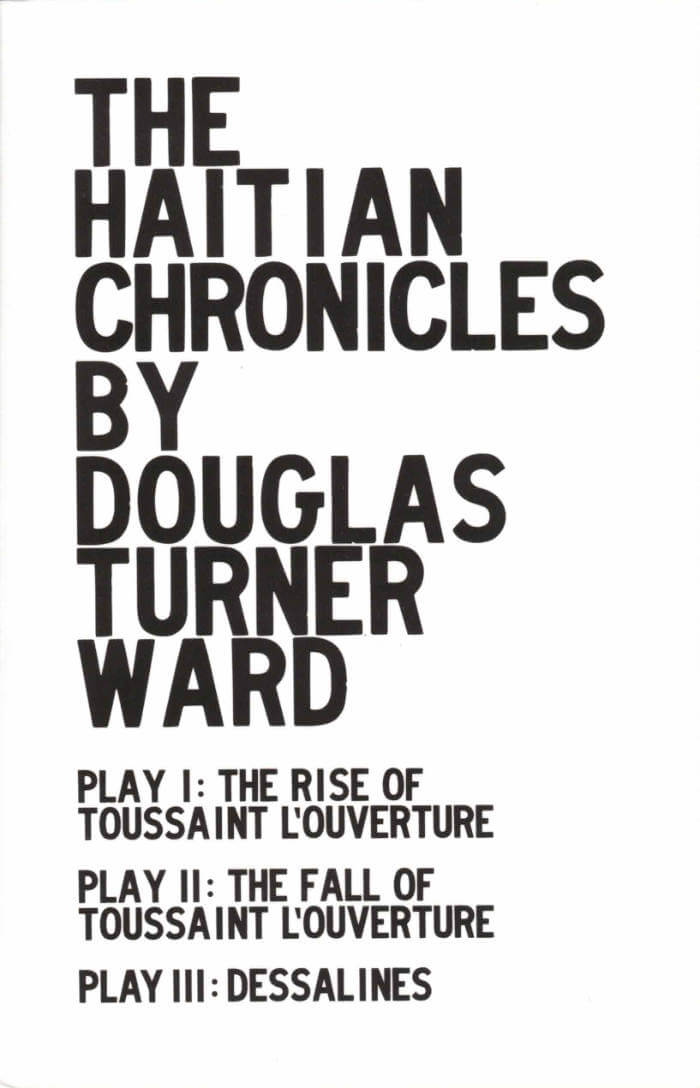Boo-Hooray
Boo-Hooray

The Haitian Chronicles
The Haitian Chronicles is a graphic and brutal history of the Haitian Revolution told across three plays. It is the final work by the influential and groundbreaking playwright Douglas Turner Ward (1930-2021) and the first play of his to be published in several decades. Though much of his earlier work has been short one-act satires, The Haitian Chronicles takes place across three long plays: The Rise of Toussaint L'Ouverture, The Fall of Toussaint L'Ouverture, and the one-man drama, Dessalines.
The Haitian Chronicles is an example of Ward's political commitment to satirizing, dramatizing, and revealing the structures of white supremacy throughout the history of this so-called civilization. His first play, Star of Liberty, written at 19 years of age, was based the life of Nat Turner and the slave revolt he led. With The Haitian Chronicles, Ward returns to armed Black rebellion, taking as its subject matter the first and only slave revolt to successfully establish a free state. It is a self-consciously ambitious work of astounding narrative and theatrical scope, featuring over 80 speaking roles and logistically demanding production design. The narrative onslaught chronicling the disgusting brutality of colonial French society and the bloody force it took to overthrow it overwhelms the reader and challenges one to question the structures on which society is built and the violence it continues to perpetuate.
Ward was one of the central, driving forces of the Black Theater movement in the United States. After moving to New York in 1948, he became immersed in the radical political scene in Harlem, writing for The Daily Worker, and studying as an actor. He served as understudy to Sidney Poitier in A Raisin in the Sun, and began a long friendship with fellow actor Robert Hooks. In 1966, Hooks helped produce Ward’s double bill Happy Ending / Day of Absence. Following the success of these plays, Ward was asked to write an editorial for the New York Times in 1966. His article, titled "American Theatre: For Whites Only?", surveyed the ubiquitous, stifling racism of the American theatre and was widely circulated, earning Ward further recognition for his political and theatrical work. With funding from the Ford Foundation, Ward and Hooks, together with Gerald Krone, founded the Negro Ensemble Company (NEC) in 1967. Writing and directing for the NEC over the next several decades, Ward worked with icons such as Paul Carter Harrison, Gus Edwards, Leslie Lee, Errol Hill, Charles Fuller, Derek Walcott and Wole Soyinka. He directed dozens of plays throughout his career including Song of the Lusitanian Bogey, The River Niger and Pulitzer Prize-winning A Soldier’s Play. Ward continued to write until his death in 2021– The Haitian Chronicles is the result of over four decades of work, a superb series of plays by an inimitable writer and artist.
Boo-Hooray proudly placed the Douglas Turner Ward Archive at Emory University’s Stuart A. Rose Manuscript, Archives and Rare Book Library in 2017. The Archive includes many working drafts of the numerous plays Ward directed and wrote, manuscript materials, and correspondence with other icons of the Black Arts.
The Haitian Chronicles was a winner of the AIGA 50 Books & 50 Cover Award for the work of book designer Martha Ormiston.

The My Comrade Anthology
The My Comrade Anthology collects pages from past issues of My Comrade selected by Linda Simpson, printed in a substantial 256-page volume on newsprint.
My Comrade was an underground gay culture zine that set itself apart from the deluge of Xeroxed zines popping up in New York in the late 1980s and early 1990s. Through parody of both mainstream tabloid magazines and the self-serious gay press, a campy and ironic sensibility, and radical left sympathies and sloganeering, My Comrade captured the zeitgeist of the gay downtown scene. Publishing 11 issues between 1987 and 1994, and three issues since, My Comrade documents the last years of underground gay culture before marriage equality and representation at elite levels of American society became the primary drivers of gay politics and aesthetic production. My Comrade was briefly revived from 2004 to 2006, and again on the occasion of the exhibition “My Comrade Magazine: Happy 35th Gay Anniversary” at Howl! in 2022.